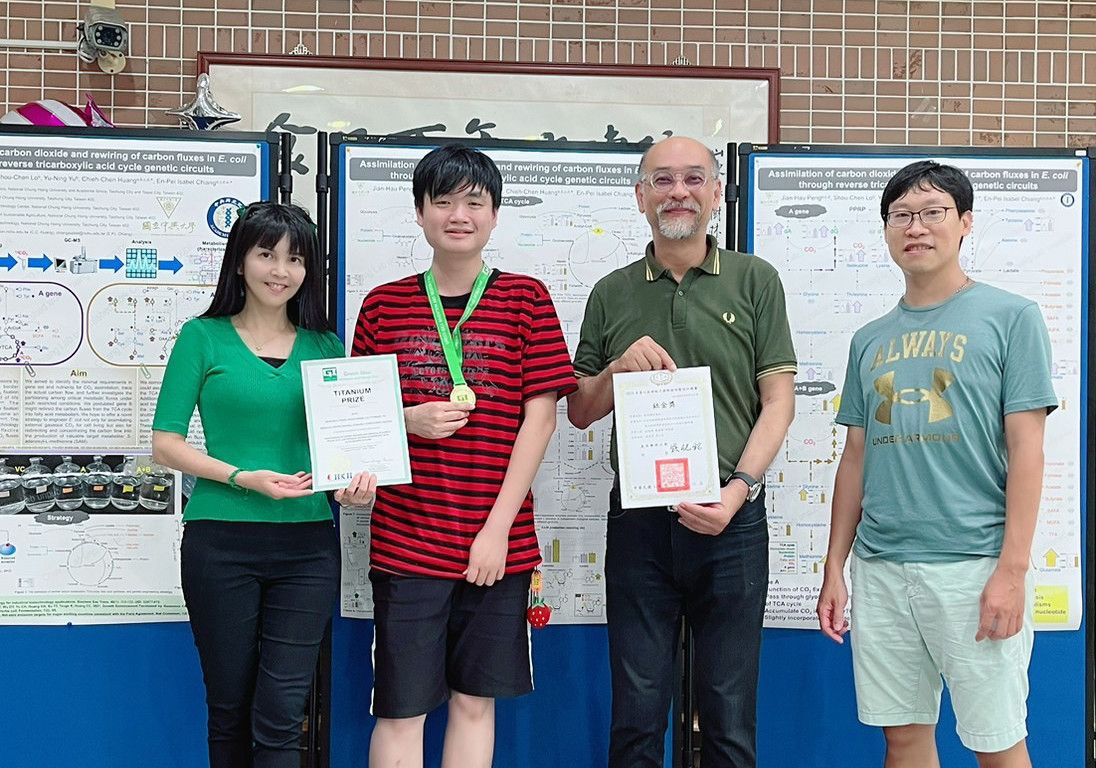2024-08-20
Director Chiang En-Pei and Dean Huang Chieh-Chen′s Team Wins First Prize at the ′Green Ideas International Invention and Design Competition

A team of professors and students from National Chung Hsing University (NCHU) has won the first prize (Titanium Award) at the 2024 6th Green Ideas International Invention and Design Competition with their project titled "Construction of Carbon-Sequestering Escherichia coli with CO2 Absorption and Carbon Flow Regulation via a Reverse Citric Acid Cycle Gene System." The competition featured 167 entries from Taiwan, the United States, Vietnam, Thailand, Japan, Korea, and Singapore, competing for the prestigious Titanium Award. The entries were divided into 27 design teams, 120 invention teams in the social group, and 20 teams in the youth group. NCHU’s team stood out from the competition with their innovative concept.
The NCHU team, co-advised by Director Chiang En-Pei of the Department of Food Science and Biotechnology and Dean Huang Chieh-Chen of the College of Life Sciences, participated in the invention category’s social group. The team members included PhD candidate Peng Jian-Hao from the Microbial Genomics PhD Program, postdoctoral researcher Luo Shou-Zhen from the Department of Life Sciences, and master’s student You Yu-Ning, who is co-advised by both the Life Sciences and Food Science departments. The team successfully developed a carbon-sequestering Escherichia coli strain using a reverse citric acid cycle gene system, capable of absorbing carbon dioxide and regulating carbon flow.
In alignment with global carbon credit policies and the government’s push for green energy development, this genetically modified E. coli strain can fix CO2 into organic matter in an autotrophic environment without the presence of organic substrates, using hydrogen as an energy source. Additionally, through metabolic engineering, the team can artificially direct metabolic pathways to produce functional metabolic products. Unlike common chemical or physical methods of CO2 fixation, this E. coli strain can further utilize the captured carbon to generate economically valuable carbon-neutral products. In the future, once the technology matures, the entire carbon fixation system could be transferred to a yeast host with greater metabolic diversity, providing more flexibility for industrial applications.
PhD candidate Peng Jian-Hao, representing the team, expressed his gratitude to the advisors for encouraging and supporting their participation. He emphasized that academic research should not remain confined to the university but should also engage with current policies and extend its impact to industry, fulfilling the goal of academic-industry collaboration. During the competition, they encountered many outstanding teams from different countries and schools, each presenting innovative ideas and creative solutions. The teams exchanged thoughts and received valuable feedback from experts in various fields, helping them identify and improve upon shortcomings in their research.
Director Chiang En-Pei remarked that with global economic development, governments around the world have increasingly prioritized energy and environmental protection issues. The team has been researching carbon flow for years and has recently applied this technology to track CO2 in metabolic pathways, successfully demonstrating the ability to concentrate CO2 into specific pathways using microbial metabolic factories and producing targeted metabolites. This research aligns with the focus of the Green Ideas International Invention and Design Competition, which is why the team earned the prestigious Titanium Award. Participating in the competition not only helps students gain academic knowledge and technical skills but also trains them to pursue external honors, improve their public speaking, and develop self-promotion skills. It broadens their horizons, allowing them to learn from other teams and better prepare for future career opportunities.
This competition provides a platform for showcasing innovative green technology projects, promoting widespread adoption of these innovative applications. Each year, it attracts over a hundred entries from around the world, offering creative individuals a stage to present their inventions, with the potential for these ideas to progress toward commercialization.
Article source: https://www.nchu.edu.tw/news-detail.php?id=58119
